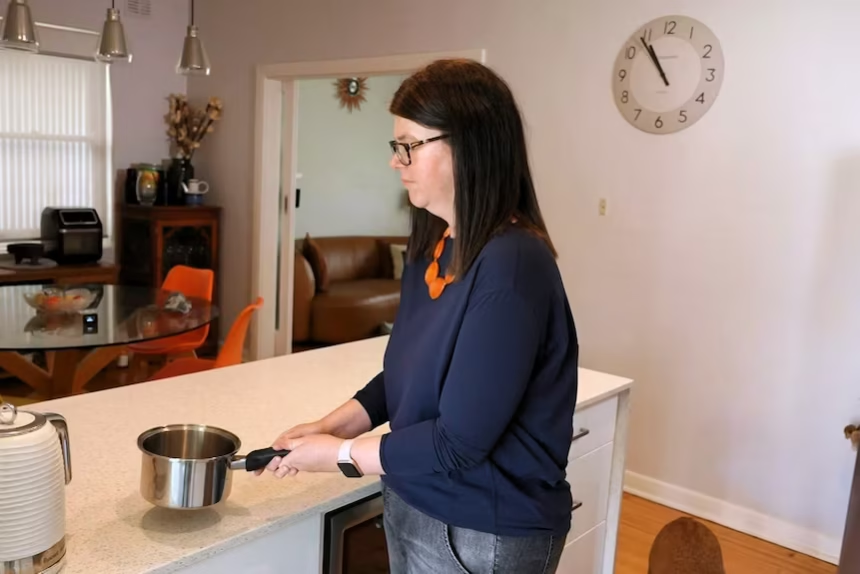NDIS Funding Restrictions Spark Outrage Among Participants
As the National Disability Insurance Scheme (NDIS) continues to evolve, participants are increasingly voicing their frustrations over funding restrictions that seem to undermine their independence. One poignant case is that of Mikaila Crotty, a 44-year-old woman from Adelaide, whose struggle with severe arthritis has made everyday tasks, such as cooking, a significant challenge.
The Challenge of Independence
Mikaila Crotty has always cherished the time spent cooking with her family. However, as her arthritis has progressed, the simple act of preparing meals has become a daunting task. Recently, she sought approval to use her NDIS funds to purchase a $2,600 Thermomix, a versatile kitchen appliance designed to chop, stir, and boil food. To her dismay, her request was denied. Instead, the National Disability Insurance Agency (NDIA) suggested she could allocate $10,500 for a support worker to cook for her.
“I was so cross… none of it really made sense to me,” Crotty expressed, highlighting the emotional toll of her situation. The limitations imposed by the NDIA not only affect her ability to cook but also her role as a mother and partner. Crotty’s severe arthritis restricts her hand movement and makes it painful to bear weight on her joints, complicating her daily life.
A Costly Compromise
In an effort to support her case, Crotty invested $1,600 in an occupational therapy report, which emphasized the necessity of the Thermomix for her independence. Despite this, the NDIA had previously approved a less expensive kitchen appliance that Crotty deemed unsuitable due to its lack of functionality and safety features. After negotiations, she was allowed to use part of the funding for pre-made frozen meals, a solution that she felt diminished her independence.
“I can’t be the parent that does ice skating or camping or hiking. Cooking is a really big part of our family, and it is something that I can do,” she lamented. The emotional weight of her situation is compounded by the fact that she feels forced to rely on pre-prepared meals rather than engaging in the family activity she loves.
NDIS Funding Restrictions: A Broader Issue
The NDIS, which is projected to reach $52 billion in expenditure this financial year, has implemented measures aimed at controlling its growth. One such measure includes the introduction of targeted lists that specify what participants can spend their funding on. Under these new rules, kitchen appliances are categorized as household living costs, akin to mortgage payments and utility bills, thus rendering them ineligible for funding.
Participants can appeal for items not on the approved list, but they must demonstrate that the item is directly related to their disability and would reduce the need for a support worker or other assistive technology. This bureaucratic hurdle has left many feeling frustrated and powerless.
Voices of Advocacy
David Petherick, interim CEO of Disability Advocacy Network Australia, noted that Crotty’s experience is not unique. He has received numerous reports of similar rejections for items that could enhance independence, such as dishwashers or microwaves. These items are often deemed non-disability-specific, leading to the absurdity of participants being assigned support workers for tasks that could be managed with the right equipment.
“It seems to be nonsensical, counterintuitive,” Petherick remarked. He emphasized that participants often have viable solutions to their challenges, yet they are denied the opportunity to implement them.
The Need for Flexibility
The introduction of targeted spending lists has led to a reduction in flexibility and choice for individuals with disabilities, according to Petherick. “They have inevitably, and probably entirely predictably, led to less flexibility and less choice and control for people with disabilities,” he stated.
The NDIA has not specifically addressed concerns regarding the flexibility of spending rules or the potential loss of independence. A spokesperson reiterated that general household appliances are not considered NDIS supports, as they are viewed as everyday living costs not directly tied to a person’s disability.
A Call for Trust and Empowerment
While acknowledging the need for sustainability within the NDIS, Petherick argues that the scheme was designed to accommodate individual cases. “All people are different and have different needs, and finding the right solution for an individual – they’re the best person to come up with that solution,” he asserted.
The overarching sentiment among advocates and participants is a call for greater trust in individuals with disabilities to identify their own solutions. “We need to trust people with disabilities to find their own solutions to the problems they’re facing in their life… not take away their power by imposing more and more rules,” Petherick concluded.
Conclusion
Mikaila Crotty’s experience serves as a microcosm of the broader challenges faced by NDIS participants. As the scheme continues to grapple with its growth and sustainability, the voices of those it aims to support must not be overlooked. The need for flexibility, understanding, and trust in individual circumstances is paramount to ensuring that the NDIS fulfills its promise of empowering people with disabilities to lead independent lives.











